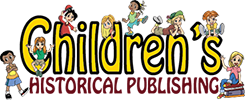Writing History for CHPS
By Sherri Goudy
Since October, it has been my pleasure and honor to write for Children’s Historical Publishing. Both as a contributor to the Empowered Women book and as the voice of these blog posts, I would like to thank CHPS for the opportunity to impart my knowledge and passion for women’s history.
Writing this book, I was aware that children who read it need to see part of themselves in order to make a connection to it. Every moment of the writing process, I asked myself: How do children relate to history and why would they want to know these things?
To be honest, I wasn’t always interested in history. Over the years, I have been able to look back and analyze why that was the case. It wasn’t until I was in my twenties and working on my degrees at Wright State University that I became interested in history. First in music history and then in public history, I gradually began to find I had a true love for it, especially that history where I saw myself. I am a firm believer that if you see someone like you doing great things-- who came from where you came from, who looks like you-- you will begin to see yourself capable of great things too. And that is a powerful thing.
As a public historian, I have made it my mission to uncover the stories of the past that aren’t common knowledge. The histories written in textbooks aren’t typically the common experience, and it certainly doesn’t capture the reaction and response of the communities you and I come from. To learn about the everyday, “ordinary” experiences and how they relate to the larger movements and events in our shared past, it becomes clear very quickly how extraordinary communities can be. And the individuals who make up those communities are the driving force.
While working on my research over the years, I have discovered many of the “hidden” stories of our community’s past. You may recall some of them from my earlier posts. Annie McCully, who is known as Dayton’s first policewoman, but she is not as well known for her suffrage work and educational role in the formation of the League of Women voters. Jewelia Higgins was an African American suffragist and community leader who was also a leader in the Red Cross.
These are just a few of the many stories that you can’t find out about simply by doing a Google search. Their bold accomplishments are not so easy to discover. This unfortunately is all too common for underrepresented communities. Historian Danielle McGuire said it better than I could when she wrote:
“My responsibility [as a historian]…is…to use my privilege to amplify or make space for the voices and experiences of people who are silenced, ignored, or disappeared.”
My passion, as a public historian and writer, is to do what I can to make a difference. I like to think of myself as a detective digging in files and archives, interviewing people, and learning how to move forward by analyzing the work that others have done before me. Doing this has taught me something that fuels my passion—everyday, ordinary people do extraordinary things. They do not let fear hold them back, and they find the courage to press forward despite the challenges they face.
As we embark on the celebration of the centennial of women’s suffrage, I hope you take these stories with you. The women of Dayton, Ohio are heroes who faced insurmountable odds yet persevered. They organized and led and defeated those who told them they were second class. They didn’t listen when it seemed everyone was saying “you can’t” or “you shouldn’t.” In a time when women weren’t permitted in the public sphere, they stepped out into the spotlight and owned that space. They made it their own, and they made it better for you and me. I hope you have enjoyed my blog posts about these exemplary individuals in our own community, and that you enjoy their stories in the book. They are inspiring and critical to our understanding of our community.


